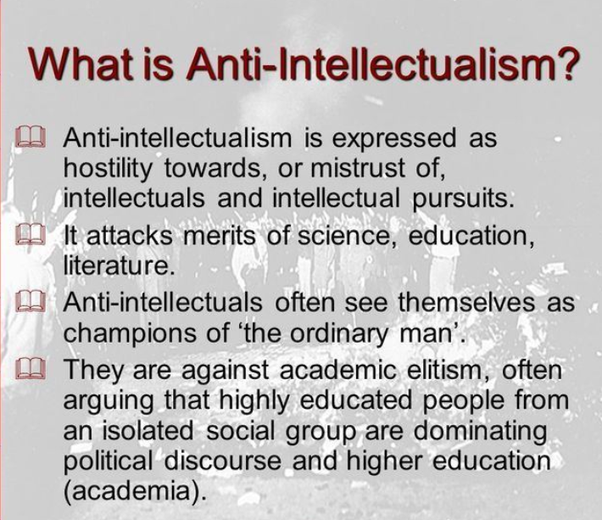I see what you mean but that would be verfitying that a belief exists itself.
My point there is that beliefs, demonstrably, (objectively), produce people's notions of what is real and what isn't. Reality isn't the sole domain of science .. and I think that's the point they're trying to make. Science's reality however has the sole purpose of being useful, whereas belief based reality is more or less about corralling the troops for battle .. (aka: hostilities - as we both agree).
stevevw said:
But I think as far as the OP is concerned I think it is more about being hostile to science itself. Being against the intellectual establishment that people percieve as oppressing them by using science or facts to dipsute how they see the world.
Is science's reality really a threat to freedom of choice(?) .. Hmm, I wonder(?)
stevevw said:
This is where I think religious people are not too concerned about the science even if it may show contradictory evidence against what a person believes. Because belief in God and what the Bible says including the supernatural events are based on faith and science does not come into for anyone to get hostile about. Though as I said there are extremists but they are the minority.
Maybe religious folk have already broken through the perception of barriers constraining how to think, there(?)
stevevw said:
I am only going by how only about a couple of decades ago and for a long time before that people held up the scientific method as the answer to humanaities problems. There was a lot of importance placed on verfication and facts.
I guess the impact of nuclear weapons added the exclamation point on the power of scientific thinking there, too(?)
stevevw said:
But in recent years some have began to question the scientific method as not being the only way to determine nature and reality or even as something that is being pushed onto society. They may have a point but this along with postmodern thinking has led to hostility towards anything that comes from the sceintific elite.
They do have a valid point there .. but there should be no reason perceive the scientific method as a 'threat'. I think that perception might be because, being totally honest, there are political influences motivating 'doing' science thesedays (because of the funding process and competition therein).
stevevw said:
How can personal beliefs destinguish reality. Isn't that a subjective view which for individuals could different for each person. I know that some support the idea that of the observer effect based on quantum physics but this is still yet to be verified if it can be at all. But when it comes to stuff like climate change, gender, human nature, human differences that people seem to become hostile to the science these mostly are based on scientific facts and not personal beliefs.
Therefore there is an urgent need to be able to educate in ways of distinguishing between extreme subjective perceptions (belief based) meanings of what's real (not quite delusions .. but close to that) and science's way?
stevevw said:
Sometimes I wonder if its even using science at all but more about politics and personal investment in the issue. But I agree they may use science that can support their case but its usually not a reliable source.
Logic is lurking underneath it all there too .. It frequently goes under the term of 'common sense', used by protesters against science, I think. One can be convinced by logic .. even when its based on an initial posit of
believed-in 'truths'.
stevevw said:
I think that plays a part but what I am talking about is a personal belief that the 'self'trumps all including the science and therefore any opposing views even based on science is seen as hostile. There is a outright rejection no matter what is presented as though it really doesnt matter what the truth or facts are.
Yep .. its an extreme viewpoint .. but also a component of it is purely reactionary, (equal and opposite), IMO.
stevevw said:
Yes I agree, and personal experience can influence how people see things. But any good science would be aware of that, of personal bias, personal experineces and identity tainting the facts. But it seems now personal experience and identity is the outcome that determines reality and everything has be accommodate that. In fact people speak about their personal worldviews like they are facts, like this has now replaced the scientific thinking that determines reality.
Scientific thinking determines a special kind of reality .. I call it 'Objective Reality', to delineate it from their belief-based purely personal subjective reality.
There's no sense for either 'side' in this argument, in rejecting either of these two demonstrably different methods we go about saying what's real .. and what isn't.
stevevw said:
Because its so connected to 'self identity' and is so personal any science or facts that oppose this perception of self in determing reality is seen as a threat and people become hostile towards that source including the science. Any scientific facts are shut down and only certain views are allowed.
That's the equal and opposite reaction to science
denying the belief-based method they're using to infer reality, IMO.
I think science need to pay attention to the objective test I'm referring to previously, IMO.


